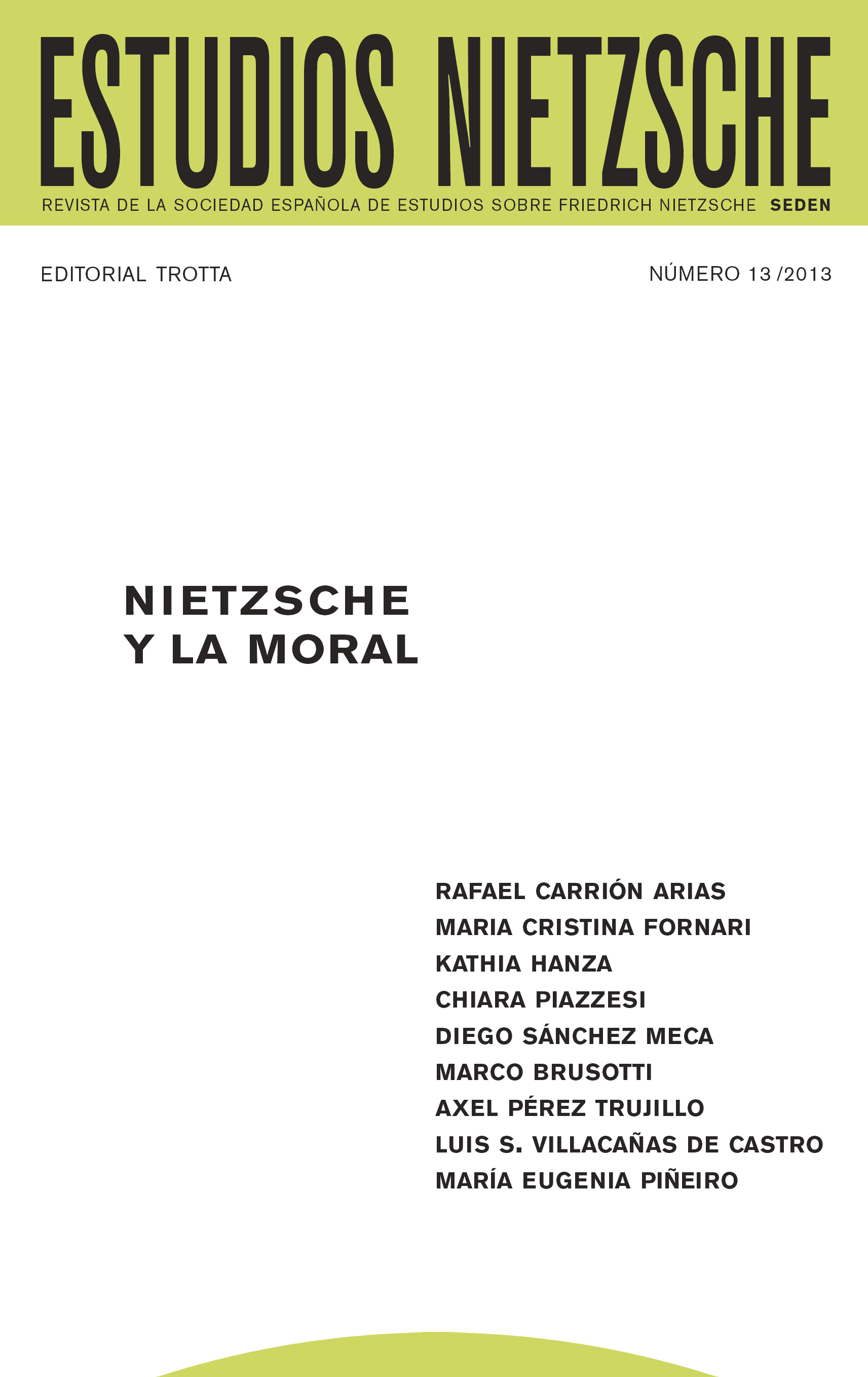Dionysus «On Truth and Lies in a Non-Moral Sense». The Dyonisian Metaphor as Pre-linguistic Phenomenon
DOI:
https://doi.org/10.24310/EstudiosNIETen.vi13.10704Keywords:
metaphor, fiction, Dyonisian, aesthetic, extramoral, interpretation, rethoric, impulse, illusion, linguistic turnAbstract
In Truth and lies in a extramoral sense Nietzsche understands that the value of truth and lies’ forms is contained in the effects of a reality production instinct; being considered «interpretations», both of them are unrelated to the traditional pretension in which they were conceived as logical principles, responding to Christian moral metaphysics. But, given that for Nietzsche’s rhetoric it is impossible to have an insight of the
essences, every process of apprehension of reality is no other thing that an interpretation that doesn’t follow a logical order but a pre-rational esthetic one, through which men immerse themselves into illusions and dreams; their looks slide over the surface of things and perceive «shapes», their feeling not only doesn’t lead to truth, but it pleases itself by receiving stimulus, as if it played to feel the reverse of things.
Downloads
Metrics
References
Duque, F., (dir.), Escritos Póstumos. Una selección. Madrid: Abada, 2004.
Fink, E., La filosofía de Nietzsche, Madrid: Alianza, 1996.
Hyden White, Hyden, El texto histórico como artefacto literario, Barcelona: Paidós, 2003.
Nietzsche, F., Obras Completas, I-IV (OC ). Director ed. Diego Sánchez Meca. Madrid: Tecnos, 2011-2016
Nietzsche, F., Correspondencia I-VI. (CO). Director ed. Luis E. de Santiago Guervós. Madrid : Trotta, 2005- 2012.
Nietzsche, F., Fragmentos Póstumos I-IV (FP). Director ed. Diego Sánchez Meca. Madrid: Tecnos, 2006-2010.
Santiago Guervós, Luis E. de, Escritos sobre retórica, Madrid: Trotta, 2000.
Santiago Guervós, Luis E. de, Arte y poder, aproximación a la estética nietzscheana, Madrid: Trotta, 2004.
Vaihinger, H., La voluntad de ilusión en Nietzsche, Madrid: Tecnos, 2007.
Vattimo, G., Introducción a Nietzsche, Madrid: RBA Libros, 2012.
Downloads
Published
How to Cite
Issue
Section
License
As of issue 21 (2021) this journal is published only in open access (diamond route).
From that number 21, like the previous numbers published in NIETZSCHE STUDIES, they are subject to the Creative Commons Acknowledgment-NoComercia-ShareIgual 4.0 license, the full text of which can be consulted at <http://creativecommons.org/licenses/by-nc-sa/4.0 >
It is the responsibility of the authors to obtain the necessary permissions of the images that are subject to copyright.
This work is licensed under a Creative Commons Attribution-NonCommercial-ShareAlike 4.0 International License.
Copyright generates two different rights: moral rights and patrimonial rights that EJFB recognizes and respects. Moral rights are those relating to the recognition of the authorship. They are rights of a personal nature that are perpetual, inalienable, unseizable and imprescriptible as consequence of the indivisible union of the author and his/her work.
Patrimonial rights are those that can be derived from the reproduction, distribution, adaptation or communication of the work, among others.







11.png)
